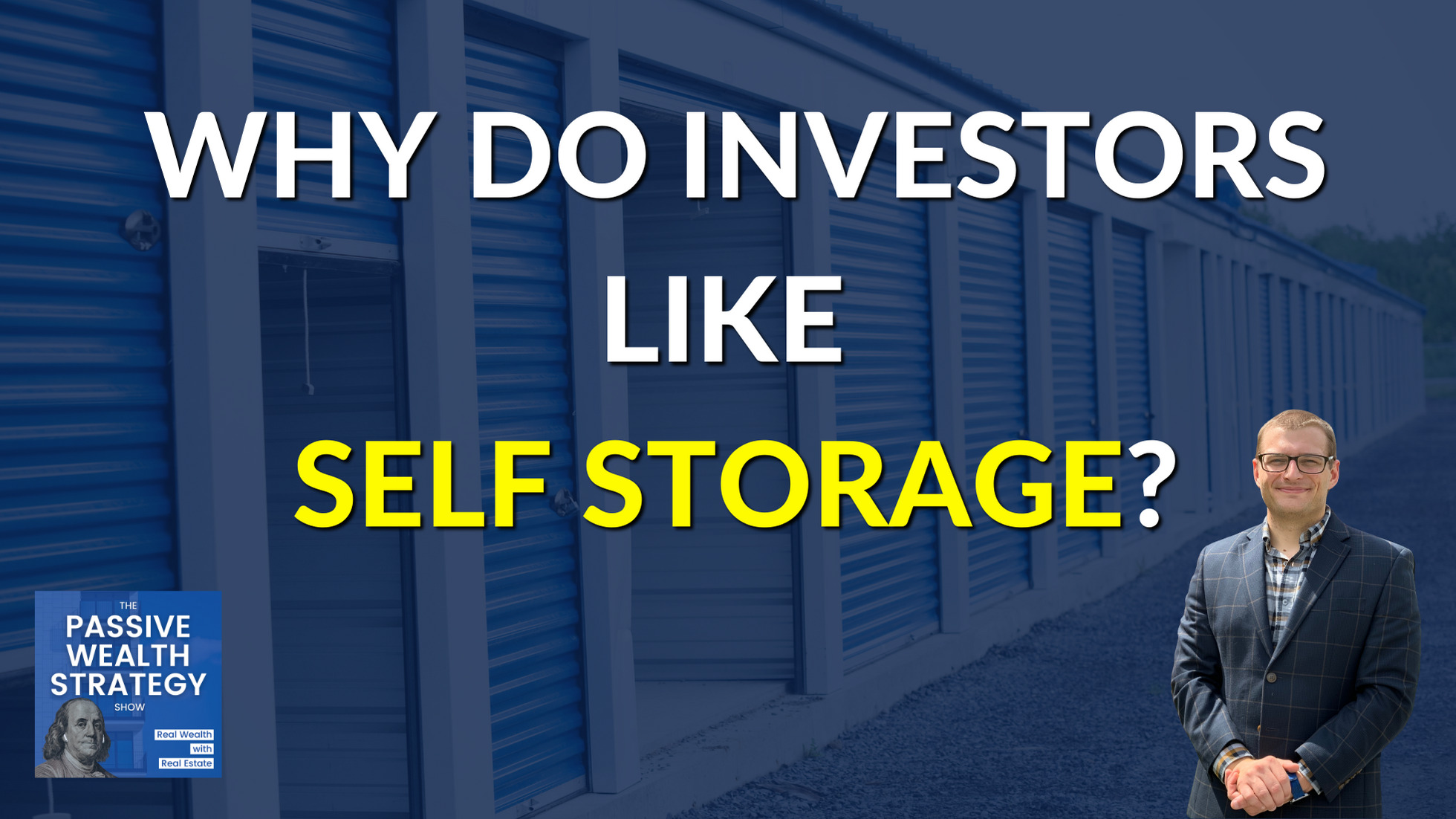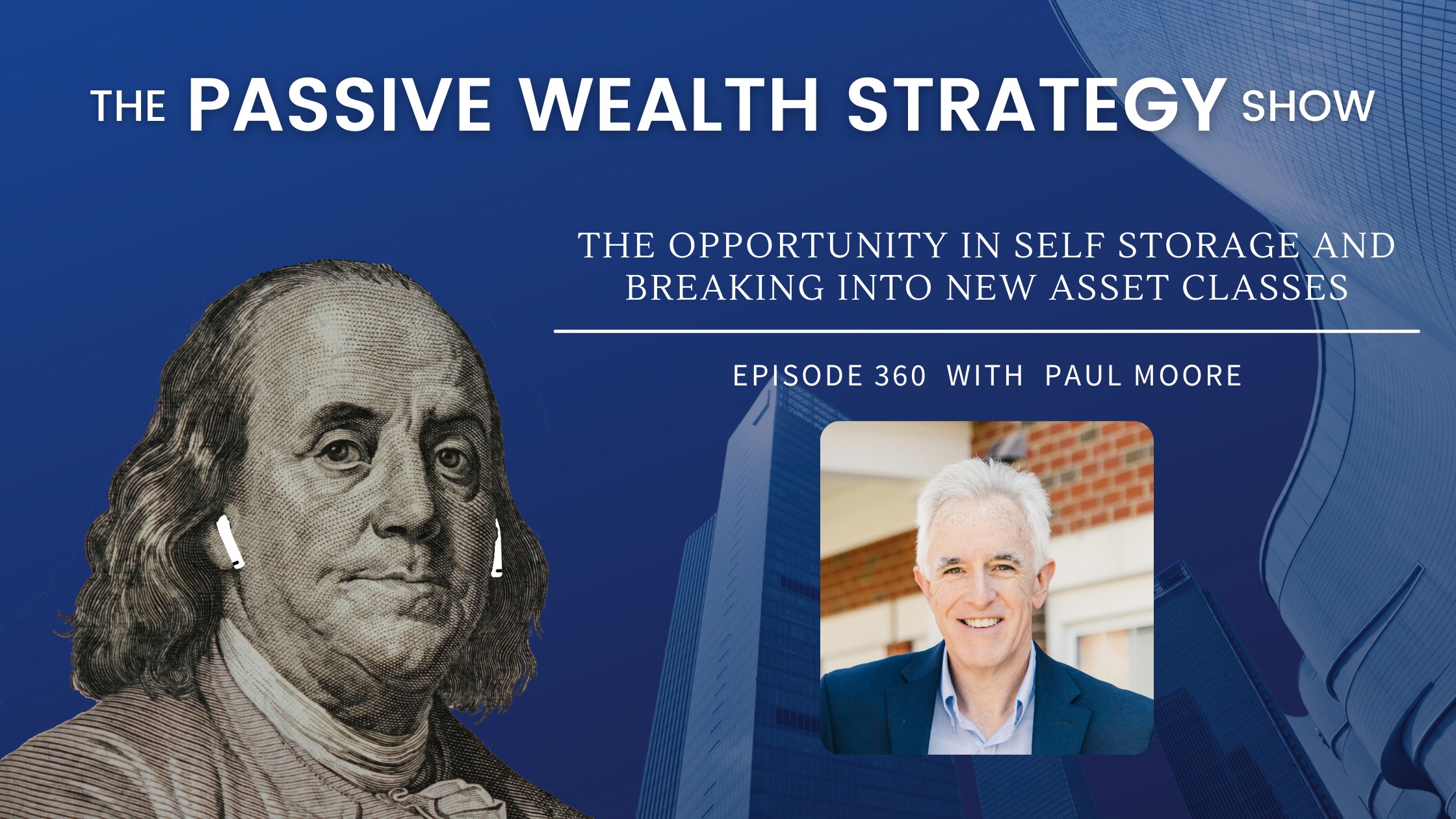
The Opportunity in Self Storage and Breaking into New Asset Classes with Paul Moore
Paul, thank you for joining us too.
And it’s great to be here. Taylor, I am really honored to be on the show again.
Hey, it’s great to talk with you again, I feel like we catch up with one another, every year for a couple of years or so. And you’ve been on the show before, right at the beginning of the passive wall strategy.
So show, so I certainly appreciate that for our listeners out there who don’t know somehow don’t know about you and your business. Can you tell us about your background and a bit about Wellings cap?
Yeah. I sold my company to a public firm in 97 and I was lost for a couple of years, moved to Virginia, and didn’t know what to do.
Started flipping houses then started flipping waterfront lots at Smith mountain lake did a small subdivision or two, and ended up over the years, doing all this residential. But I wasn’t sure how to get involved in commercial real estate. Finally built a multifamily, which was quasi. Hotel in North Dakota for the oil boom in 2011.
And basically decided I loved multifamily, got some actual mentoring and coaching along the way, ended up writing a book on multifamily investing, and since then have expanded to add self-storage and mobile home parks through our syndicated funds. So that’s.
Awesome. And, you recently wrote a book about self-storage, and I find that the pivot is very interesting, because, from my perspective, you identified the attractiveness of self-storage and mobile home parks as a general investment asset class pretty well before the rest of the market got hip to those businesses as a, as an investor.
Yeah. I wish I would have done it a long time ago. Sam Zell, America’s most successful real estate investor with 158,000 mobile home park pads was onto this, decades ago while we were all turning our nose up at mobile home parks. My, my momma said, don’t go to the trailer park.
And I thought that meant I shouldn’t invest there 30 or 40 years later, but I really should have. Listened to my heart and looked closer at mobile home parks years ago, and self-storage. I actually looked at self-storage in 1998 when I had a bad experience at one. And I thought, man, I should buy one of these.
And then I. Just let it go because I thought, I’m a little worried that somebody else with a bigger, better mousetrap could build their storage down the street. And that’s still the number one risk in self-storage today. So I was right about that, but I was wrong about the viability of the business.
It is truly unique and wonderful.
So, that risk identifying that risk, especially, before you’d even gotten involved in the business is very important. And I think. It’s important to talk about the risks. Generally speaking of these asset classes that everybody gets so excited about.
I’m excited about self-storage too. I love self-storage, but we’re not being honest. If we imply that there are no risks and I’d love if we could dig into any of those other ones. The. The case of adding new supply getting potential competitors is a big one, but are there any other risks in the asset class of self-storage that, stick out to you or, come to mind that you get concerned about.
Yeah, the biggest risk of course is during lease-up. So when you have a brand new facility, or if you just did a big addition or you’re taking over a half vacant self-storage facility, it’s especially risky. If a national competitor builds down the street and we had this happen, once we invested in Florida in 2018 and a deal and two large national competitors popped up nearby.
Now that does tell you something, it tells you that the demand. Was strong and the area was growing, but yeah, it was a painful slog to get fully occupied, I think probably for all three facilities, but they were in a position to under, out-market us out, man, us, and under price us. And so it took a while, but eventually, after 3.3 years, I just happened to know that cause we just finished it out.
We sold the property and the investors as a whole made an 80% profit in about three and a half years on this investment. So it turned out. Okay, nice.
That’s good. Let’s say the cash flow allows you to float along and, during the tough times, but that’s a big question, especially during lease-up.
Are you going to be earning enough to make your debt payments hold onto the property?
Yeah, and that was a tough one, but the risk, also is that you’re, you locate in a wrong location and that’s easy to, should be easy to fix what the little due diligence using tools like radius plus checking the vehicle count per day.
The daily vehicle count. Checking the visibility and the signage ability that you have and checking the income levels for the area. The big four that you should do, and you can do, all four of those within minutes of finding a self-storage facility. And if those don’t all check out well, probably ought to run away.
I guess what could happen is if you’re really not thinking through it, you could locate, and have a long-term play in an area. Declining in population, there’s a big move to the Sunbelt and Southern states. And areas that are declining in population would not be a place I’d want to be either.
I’d think that would be a big risk.
Yeah, absolutely. And that’s one of the things that. I wonder, I think people wonder about rather about self-storage, in particular, is, you say the people always say the millennials are killing XYZ industry. The millennials don’t want stuff.
The millennials, so on and so forth. Have you found that self-storage is, resilient to maybe some of these generational shifts that people have preconceived notions about and how you build a, case for self-storage? When there are questions around, shifts in industries and consumption habits, general.
Yeah. So self stories. There are about 53,000 facilities in us. That’s about the same as subway Starbucks and McDonald’s combined, but about three out of every four are run by independent operators. And two out of every three of those independents are mom and pops to find. Someone with only one facility.
Now, these folks typically don’t have the resources or the knowledge, or the desire to increase income, to make the upgrades, and to maximize value. They don’t need it. Because cap rates have shrunk to a level where they’ve doubled the value of their facility, even if they’ve stayed right where they are in operations and rent collections.
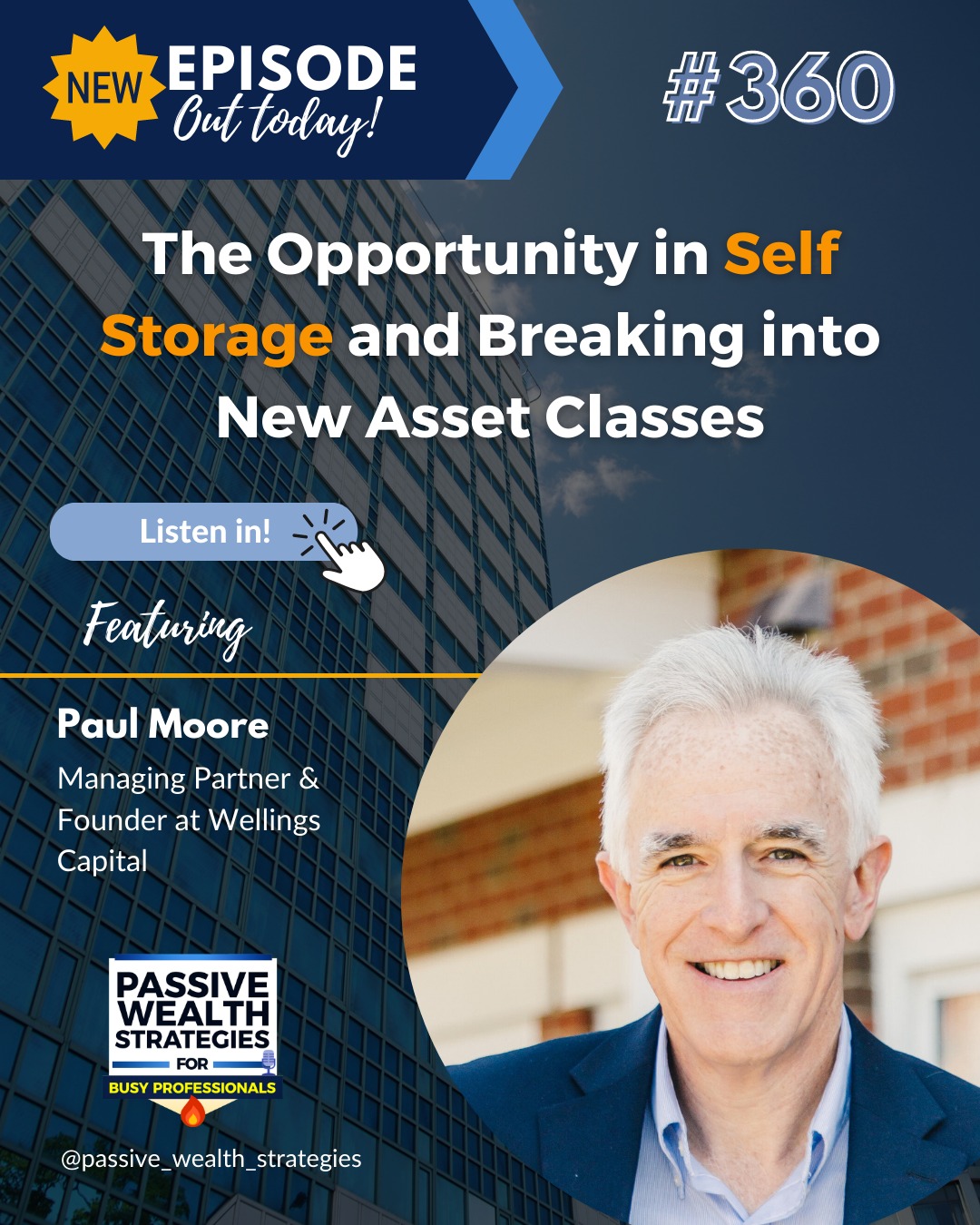
The Opportunity in Self Storage and Breaking into New Asset Classes with Paul Moore
So the cool thing is a lot of these facilities have a lot of upsides. I call it intrinsic value extraction, which is another word for value adds. There’s a lot of stuff you can do as a great operator to move in and make, Income increases and great equity increases for your investors.
One of the things I love the best answer to your question is they’re very price inelastic. Think about it. If I’m renting an apartment from you in Richmond for a thousand dollars a month, and you increase my rent by 6%, then I. Move out rather than paying the extra 60 a month locked in for seven 20 a year. But if I’m renting a storage unit from you a month to month for a hundred dollars and you raise the rent 6%, I might get irritated, but it’s going to hit my credit card, six extra bucks next month, isn’t going to kill me.
And it’s way easier to pay the six bucks than to get a U haul, get my friends together, spend a weekend, moving my junk treasure. Excuse me. Just to save six bucks a month, especially when they can raise their rates next month too. And so self-storage is quite resilient to rent increases. And that’s why I say the worst, the riskiest time is during lease-up.
And so we found that all, age ranges and demographics are jumping into, needing self-storage. And I could go through examples of that, but suffice it to say that. It has been just a great ride, actually, a wall street journal, New York times green street have all reported in the last four months.
How self-storage has been the big commercial real estate winner since COVID. And one of the reasons Taylor, as there was no eviction, more. And another reason is cause there’s nobody living in these units in theory. And the other reason is, there’s been a lot of the four DS. They’re all unfortunate.
These are unfortunate situations, Dislocation downsizing, and divorce. Most of those are unfortunate dislocations that can be actually a positive, but when people are moving from New York City or Chicago or LA to places like Richmond, Charlotte, Florida, Utah, Texas, they’re often using self-storage along the way.
And when offices are downsizing, office space is on the decline right now, as we all know, and that can cause a need for self-storage when a restaurant or bar closes can cause a need or desire for self-storage. So lots of good things happening in this business right now.
Now nice now not to backtrack too hard, but one topic in particular that I’ve really wondered about in this space is that.
The mom and pop owners. And that was historically, and still is a huge portion of the assets out there owned by mom and pops. But we see consolidation in many industries, particularly in rental housing, we see consolidation, apartments, and so on and so forth. And I do wonder at a certain point.
You know that the consolidation could only go so far with the mom-and-pop self-storage facilities. And it seems like we still have a ways to go till that happens, but I just wonder what your thoughts are about that and that kind of shift in the sophistication of the owners. And the self-storage industry.
Yeah like I mentioned, a lot of the mom and pops are just happy having these as they call them big metal boxes that spit out cash. And as long as they view them that way, we’re happy because they’re looking at it as a semi-passive investment rather than something to be actively managed.
When I heard the value add in self-storage, I think I laughed because I’m more, we talking about. Four pieces of sheet metal, rivets of the floor, a door. What are you going to upgrade? You’re going to sweep it out. Where is the value adds? But there are lots of value adds. You can add your haul and add maybe $3,000 a month.
For example, to your net operating income, 36,000 a year at a six cap. That’s $600,000 in value. Right there. You can add showroom items like locks, boxes, tape scissors. Upsells on units, all kinds of things you can do. You can add boat and RV storage to that five acres sitting on the side that the self-storage owner just threw in with the deal.
And there are lots of great opportunities. And these value adds can add up to almost unbelievable profits at this point. And especially if you’ve got, a sound opera. Great technology, great team, and the ability to upgrade these facilities in a time-effective manner.
But it seems like what you’re doing maybe some of the implications you’re making there.
If I’m maybe I’m reading into it too much, you let me know if that lady’s mom and pops. Aren’t doing those value adds. They’re not adding sophistication to their business systems. They’re not necessarily. You haul in place or keep their rents up with the market or anything like that, is that what you’re seeing in this space?
And there’s still plenty of opportunity for more sophisticated operators.
Oh, absolutely. One thing I didn’t do a good job of in my book, I think is really taking into account fully automated facilities. I, in the book I talked about, how you haul and showroom items and a lot of the upsells and things, you couldn’t get that without an employee.
At the same time, some of these smaller facilities, maybe a 20 or 30,000 square foot, two or 300 unit facility might benefit from the automation that now allows you with just an iPhone or any smartphone to rent a unit to get in and out of the gate with a code and to even sometimes acquire some of these showroom items.
And honestly, I think that automation can sometimes really help a mom-and-pop facility. I know one operator who has one lady sitting at a desk with 12 large computer screens around her, and she’s monitoring all 12 facilities that he owns and she’s actually interacting with clients. She’s watching the security cameras.
She’s, one 12th of an employee per facility now.
Wow. Wow. That’s a big value add. So you’ve been involved with a few different types of real estate in your, real estate investing career. You detailed for us earlier. And. Obviously, I think how to get into different asset classes and how to make a, how to pivot your business effectively rather than what happens to most people and get shiny object syndrome and then never make any progress anywhere.
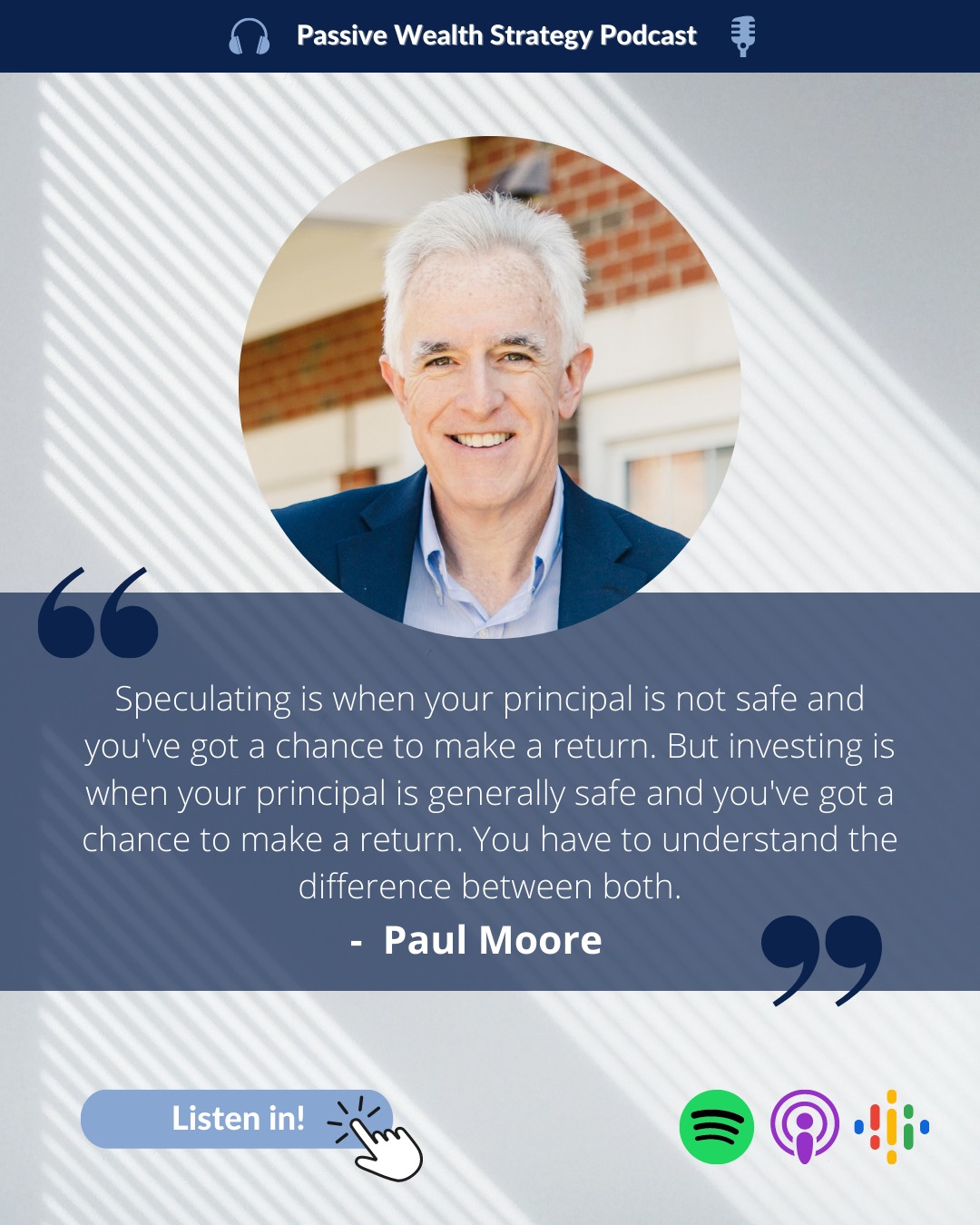
Speculating is when your principal is not safe and you've got a chance to make a return. But investing is when your principal is generally safe and you've got a chance to make a return. You have to understand the difference between both.
Paul Moore Tweet
So that, that ability to get into a new aspect or a new realm of commercial real estate is a meta-skill, I think would be interesting to dig into. So you’re, do you have any thoughts about, paths to get into. Different types of, a new type of commercial real estate for somebody who’s considering just getting started in a particular area.
It’s funny. I spent the last one-third of my new book on seven paths to getting involved in commercial real estate. And the reason I did this is that I had proposed a book to bigger pockets years ago. Called the seven paths to commercial real estate success or something like that. And they turned it down.
I’m not better, but they did let me sneak it into the last third of this book, which was basically seven paths to get involved in any kind of commercial real estate, whether it’s multifamily or self-storage mobile home parks, cell towers, industrial retail, hotels. And yeah. Few of those paths right now.
In fact, I’ll just do a quick overview of the seven paths and you tell me if you want to take a deeper dive. How about that? Sure. So the first way would be the long and winding staircase, which would mean you basically get a small asset, you improve it, you rent it out at a higher level than you sell it.
And you take those proceeds and buy a bigger asset and just keep going up the stairs. I know this works. I also know it’s a long, hard road to the. The second path would be a risky path and that would be being a capital raiser. If you’ve got connections to people or money or great social media or online marketing skills, you can be a capital raiser.
The risk, of course, is the. He sees, is watching to make sure we all do everything right? So check out those risks and be really careful. If you’re going to take this path, you really need to be either a Koji GP or a broker-dealer unless you just want to take a flat fee. A third PO possible path would be being a deal finder.
Now, a deal finder is somebody who acts like a commercial broker. But they basically don’t want to get a commission. They want to stay involved in the deal. And so this could be, look like, you’ve got great connection skills. You can drive around. You can knock on a lot of doors.
You can send a lot of postcards and you can try to connect deals to investment firms or syndicators that need deals so desperate. And you stay involved, you get a piece of the ownership and make yourself really useful. Eventually, maybe you’ll get a partnership in the company, a next path, the path number four would go big.
If you retired from the NFL, made a lot of money on the lottery or Bitcoin, or you have family money you inherited and you want to just start out at a big level. You can do it. Just get a really good team around you and listen carefully
to them. The fifth path is getting a job. Now, most people listen to your podcast because they want to get out of their job.
But getting a job might look like becoming a commercial real estate broker, a self-storage broker, or a multifamily. Or it might be looking like getting a job at a lender for commercial real estate or an asset management job, or it could be a property manager job. I know a guy who took a 50% pay cut to basically become a self-storage property manager, so he could learn the business from the inside out.
So this definitely could work, but it’s a long path as well. Path number six is taking the passive path. Interact sometimes on bigger pockets forums about. A lot of investors who try to do it on the side in their spare time, really have a really hard time making a go of it. And they end up being a mom-and-pop investor or syndicator.
And so some of the best paths, one of the best paths for many people is to find a great syndicator and in. Heavily with them after doing due diligence. Of course, the seventh path is one that I really like, and I’ve done it a number of times and that’s finding an unpaid mentor or a paid coach. A mentor might be somebody who would actually allow you to tag along with them on projects and meetings and learn the business while you do something for them.
Maybe you could do social media online by posting paid ads online. Maybe you could do Excel analysis for them and maybe you could actually be a deal finder for them and end up getting a piece of the ownership on that. One of the benefits of a paid coach also as you and I both know is we can sometimes partner with the paid coach.
Go back to path number two and be a capital raiser for that deal. For that coach, I am really getting a legitimate partnership going with them or better yet be a deal finder with that coach and raise money. And then eventually, Hey, we’re spun off on our own with our own track record. So those are the seven paths to potentially entering, I would say self-storage or any commercial real estate before.
Okay, so a great, and I think one of the overarching themes and those are, or I would maybe even rank the those into two separate categories is there’s one category of basically building a business or a really committing heart and kind of getting away from what you were doing. And I don’t want to say getting a job, but like starting a new business.
And then there’s the passive investing route. And. At a, at a, maybe a first step is a lot of people have to make that initial decision of, am I going to be active? Am I going to invest a lot of time in this business? Or am I going to focus on what I do for my job and really make my money there and just look to build wealth through real estate more passively.
Would you agree with that characterization or what are your thoughts about it?
Yeah. I think a lot of people who are focused on their job, their career, or their family and career or their retirement and their family, a lot of them really. Honestly, they get over their heads on these deals. I can’t tell you how many investors I’ve talked to who actually are trying to do deals on the side.
Like the oral surgeon I talked to in the Pacific Northwest, he was telling me about his 20 unit portfolio. He’s buying 20 pretty nice houses to run out, to replace his income, and retire. Then they side, and he said, Yeah, I’ve got to talk to painters between surgeries. I’ve got a screen tenants in the evening.
I barely have time to do this. And then he said, and I’m only on my third house. And I was like, man, and he said, that’s why I called you. I’m interested in the past, we’ll be investing. And so I think it’d be really, I’ll say. Great. If you can be obsessive really good and have the chance to be the best in the world at this, or you should find somebody who is an expert in invest with them.
Yeah. In that case, in particular, I’ve spoken with a lot of people who are similar. Position, and it can be tough initially to give up some of that control or really have confidence that you’re finding the right person or a company to passively invest with. That’s scary. It’s true.
Especially for smart people.
Yeah. Yeah, that’s true. Our friend, Brian Burke of course wrote a great book, the hands-off investor, and he gives 300 pages of how to vet operators and how to vet deals. And that can really accelerate someone’s opportunity. An LP investor’s opportunity in figuring out who to embed.
Before we head onto the final part of the show, do you have any parting thoughts about the future of self-storage investing you mentioned earlier that cap rates have compressed, basically for over the last decade, who knows where we’re going to go from here? We’re just hopefully crossing our fingers.
Maybe nearing the end of the Coronavirus pandemic, the future is always uncertain, but what are your thoughts moving forward in self-storage? There have been some threats to self-storage as a business.
Some of the what’s it called the packrat thing, where they come out and they pack your stuff and they put it in storage and they.
Maybe a kiosk where you can get your stuff out through automation, conveyor belts, et cetera. And it’s hard to say what the future of self-storage is, but I can say that right now, I can take you to Nashville and show you why it’s completely overbuilt, but I can take you to Belmont or Bellevue south of Nashville and show you why it’s undersupplied.
And so there are pockets. Lots of pockets. Heavily overbuilt, but if you look where the population’s going, you don’t get into much of an overbuilt situation. This is a great place to invest for now, as far as predicting any more than that. I don’t really know if I can.
Interesting. I certainly appreciate your conservative viewpoint on this and not making any, lofty and somewhat ridiculous predictions.
Some people like to make about their pet asset class. Love it right now, but I take a quick break for our sponsor. All right, Paul, I’ve got three questions. I ask every guest on the show. Are you ready? I’m ready. All right. These questions. I don’t think they existed. You were the first interview on the shell, so it’s been what, four years.
So yeah, we’re getting to it. The first one, what is the best investment you ever made other than in your education?
The best investment I ever made was perhaps a mobile home park in Louisville, Kentucky. In fact, this mobile home park was acquired. The week COVID went mainstream. When the stock market started its 33% slide, February 20th or so of 2020 it was acquired for 7.1 million and.
Four or five major upgrades. The owner had not visited the park in years. The person running the park was doing fine but was overpaid. The expenses were bloated. They were actually paying for all the water and sewer for all 300 or so tenants. There were 50 vacant slots. For mobile homes lots of potential upsides, oh, including the fact that their rents were 25 or 35% below the market.
Mobile home parks for a different reason than self-storage are quite sticky. People usually don’t leave. The average state of the mobile home park is 13 or 14 years and they’re a 95 to 98% chance that a mobile home, once it’s placed in a park, never leaves that spot. So bottom line, this, if that’s still possible this property, a lot of the upgrades were done quickly.
And then right in the middle of some of the worst months of COVID in August six months later of 2020 the operator got an office. He acquired it for 7.1 million which was half debt, half equity. He got an offer and accepted it for 15 million. And so the IRR, which is easy to manipulate, I get it by a quick sale.
But the IRR on the equity was 347% gracious.
Yeah, IRR as a metric is pretty. Tricky and what I do, we’re not even allowed to state IRR by regulations, but then, I think equity multiple is very useful as well. And certainly, that was high in that case. So probably all the metrics look pretty good.
Yeah. Nice. We have the best investment. Now I go to the other side of that coin, the worst investment. What is the worst investment you ever made?
Taylor, I got a podcast called how to lose money. So yeah. Thank you. I have a few of that one that comes to mind is in 2006 or seven, we could see a lot of signs on the wall.
The handwriting on the wall. I should say that the real estate market was about to crack. I bought one more waterfront lot and an expensive waterfront lot at Smith mountain lake in Virginia. With the thought of reselling it for a profit. I got several people telling me it was a bad deal, but I charged ahead and I ended up losing a couple hundred thousand dollars over 12 years.
It took me to finally resell that lot for a deep discount, a brown around 2019. And so I think that was my worst.
Wow. Wow. And I wonder, have you looked at what if you’d held it to today? Real estate in Virginia has gone crazy. I don’t know about Smith mountain lake though. Yeah, it has gone way up.
And I think if I would’ve held it two more years, I would have made, I might’ve only lost 150,000 rather than 200 and some, but yeah, I, it was just a bad investment and the good news is I reinvested that in this same group that did. Louisville mobile home park. And honestly, I have made a lot of money on that.
The principal that I ended up getting back from the sale of that lot, I’ve actually gained a lot since then. I think I gained almost as much, if not more than not that I lost because that’s going to take years to make up. But I think I gained more than I could’ve ever by sitting on that line.
Wow. Wow.Interesting. My favorite question here at the end of the show is what is the most important lesson you’ve learned in business and investing?
Oh, by far, it’s the difference between investing and speculating? When I sold my company in 1997 I started a nonprofit organization, but I also had some cash and I thought I’m an investor now.
And I wasn’t an investor. I was a speculator. I didn’t know the difference. And I, in so many ways, I did not know the difference. And I’ll tell you that, speculating is when your principal is not at all safe and you’ve got a chance to make a return. But investing is when your principal is generally safe and you’ve got a chance to make a return.
Warren Buffett taught me the difference and I’m so glad he did. And I recommend that people. Speculate. If you want to buy some Bitcoin, et cetera, don’t expect that will be the basis of your wealth creation. Most wealth is created through very boring investments, over a long period.
Nice. Paul, it’s been great talking with you.
Once again, having you back on the show and I look forward to hopefully seeing you in person at some kind of real estate event here this year or in the future if folks want to reach out if they want to get in touch if they want to learn more about what you’re up to or anything like that, where can they track you down?
Over the years, I really wondered how to get involved in commercial real estate. As I said, I wrote a guide for that and people can get it free by going to my website it’s Wellings. Wellingscapital.com and they can put forward-slash resources to get special reports on self-storage.
Mobile home park investing and that commercial real estate special report.
Awesome. Thank you once again for joining us today and to everybody out there. Thank you for tuning in. If you’re enjoying the show, please leave us a rating and review on the apple podcast. Five stars. If you don’t mind, guys, I appreciate that so much that helps other people learn about the show, because that helps us rank higher in the apple podcast ecosystem.
And I’m always honest with you guys that gives me a nice little warm and fuzzy feeling because I get this. You’re engaging with the content and you’re escaping the wall street casino along with us. If you know anyone who could use a little bit more passive wealth in their lives, please share the show with them and bring them into the tribe.
Thank you for tuning in once again. Hope you have a great rest of your day and we’ll talk to you on the next one. Bye-bye.
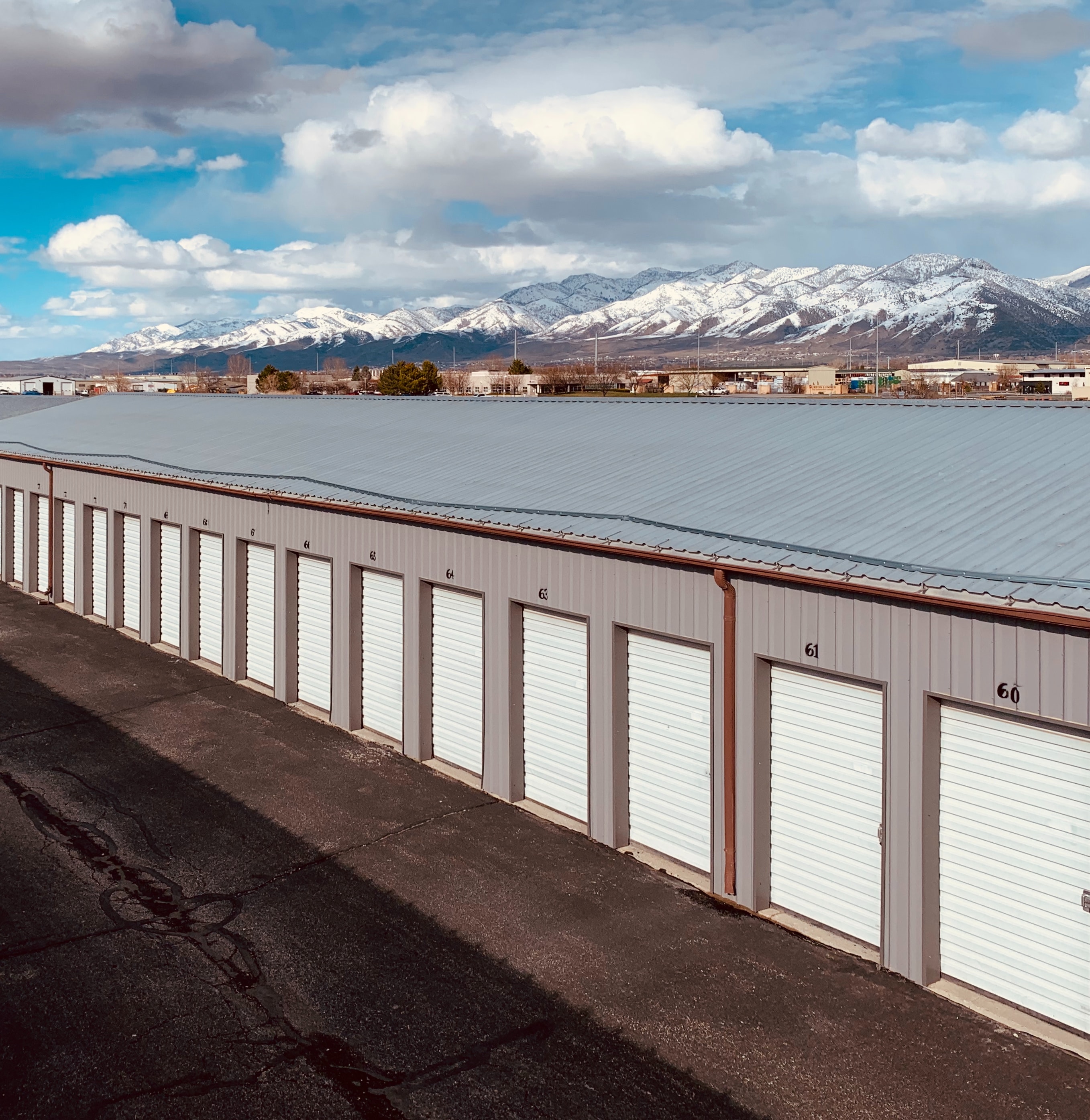
The Opportunity in Self Storage and Breaking into New Asset Classes
About our Guest
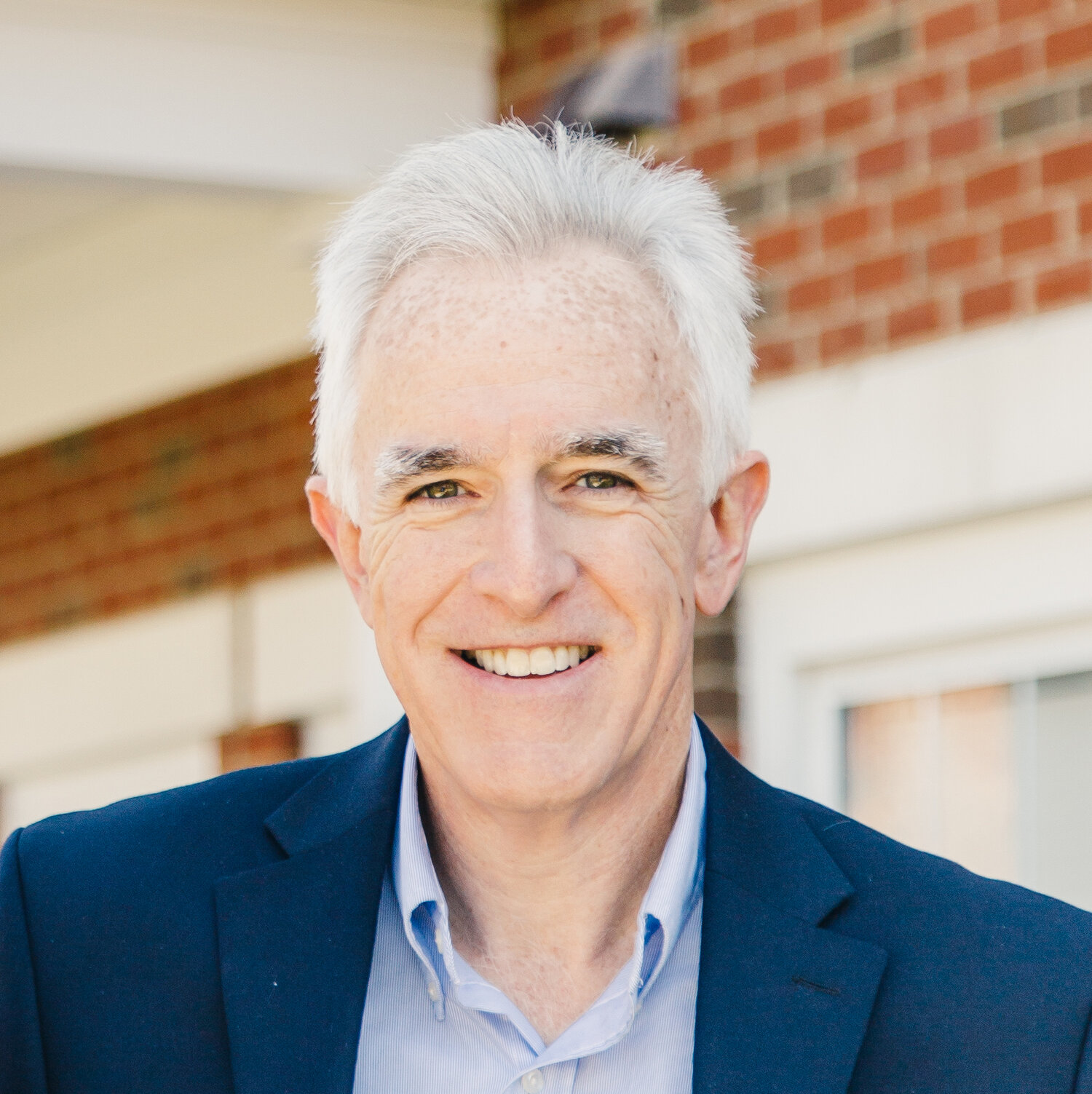
Paul Moore
Paul Moore is the founder and managing partner of Wellings Capital, a company that vets and invests in large-scale commercial real estate projects, including self-storage syndications.
In the real estate sector, Paul has been investing for more than twenty years—he has completed more than one-hundred real estate investments and exits, appeared on an HGTV special, developed a waterfront subdivision, built and managed a large multifamily property, and launched a successful online real estate marketing firm. Paul co-hosted How to Lose Money, a wealth-building podcast, contributes to BiggerPockets.com and Fox Business, and is a two-time Finalist for Michigan Entrepreneur of the Year.
Episode Show Notes
Paul Moore is the founder and managing partner of Wellings Capital, a company that vets and invests in large-scale commercial real estate projects, including self-storage syndications. In the real estate sector, Paul has been investing for more than twenty years—he has completed more than one-hundred real estate investments and exits, appeared on an HGTV special, developed a waterfront subdivision, built and managed a large multifamily property, and launched a successful online real estate marketing firm. Paul co-hosted How to Lose Money, a wealth-building podcast, contributes to BiggerPockets.com and Fox Business, and is a two-time Finalist for Michigan Entrepreneur of the Year.
[00:01 – 04:41] Opening Segment
- Let’s welcome back Paul Moore
- Paul introduces Wellings Capital and his multifamily and self-storage journey
[04:42 – 15:38] The Opportunity in Self Storage
- The Number One Risk in Self-Storage
- How to Address the Wrong Location Risk At Hand
- Resilient to Generational Shifts
- Big metal boxes that spit out cash
[15:39 – 27:01] Breaking into New Asset Classes
- Taking into account fully automated facilities
- 7 paths to getting involved in commercial real estate
- Choosing between actively or passively investing
- The Future of Self-Storage
[27:02 – 37:11] Closing Segment
- Quick break for our sponsors
- Groundfloor offers short-term, high-yield real estate debt investments to the general public. Check www.passivewealthstrategy.com/groundfloor/ to get started.
- What is the best investment you’ve ever made other than your education?
- Mobile Home Park in Louisville, Kentucky
- Paul’s worst investment
- Waterfront lot
- What is the most important lesson that you’ve learned in business and investing?
- “The difference between investing and speculating.”
Connect with Paul Moore through Facebook, BiggerPockets, and LinkedIn. Visit Wellings Capital and get the latest special reports on self-storage, mobile home park investing, commercial real estate.
Invest passively in multiple commercial real estate assets such as apartments, self storage, medical facilities, hotels and more through https://www.passivewealthstrategy.com/crowdstreet/
Participate directly in real estate investment loans on a fractional basis. Go to www.passivewealthstrategy.com/groundfloor/ and get ready to invest on your own terms.
Join our Passive Investor Club for access to passive commercial real estate investment opportunities.
LEAVE A REVIEW + help someone who wants to explode their business growth by sharing this episode or click here to listen to our previous episodes
Tweetable Quotes:
“Self-storage is quite resilient to rent increases. We found that more age ranges and demographics are jumping into self-storage.” – Paul Moore
“Automation can sometimes really help a mom and pop facility.” – Paul Moore
“Speculating is when your principal is not at all safe, and you’ve got a chance to make a return. But investing is when your principal is generally safe, and you’ve got chance to make a return.” – Paul Moore







